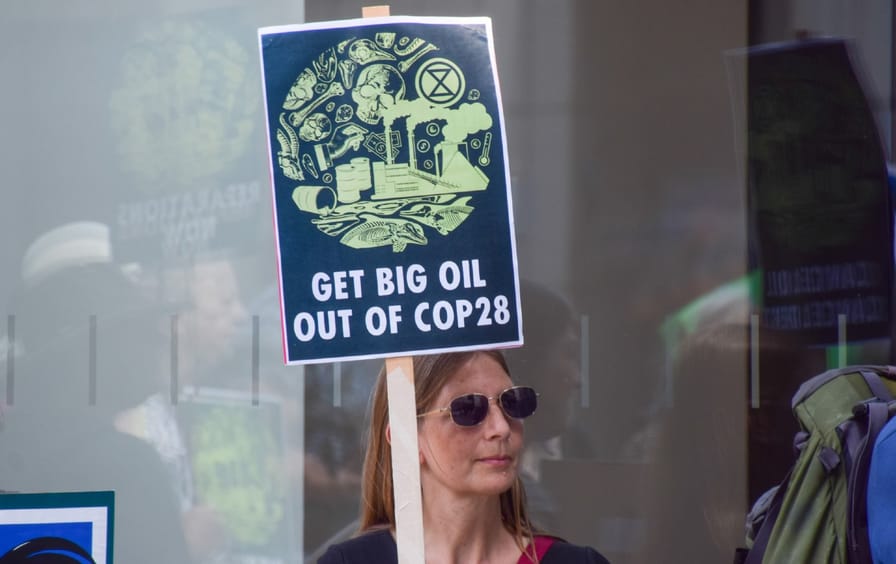Politics
Today 1:11 pm
Exclude Fossil Fuel Firms From COP 28 if They Only Want to Obstruct
Exclude Fossil Fuel Firms From COP 28 if They Only Want to Obstruct
“My patience ran out,” said Christiana Figueres, who for years had advocated for oil companies to be involved in policymaking talks.
September 22, 2023
A climate activist holds a placard opposed to oil companies taking over COP 28, during a protest in London on June 12, 2023. (Vuk Valcic / Getty)
This story originally appeared in The Guardian and is part of Covering Climate Now, a global journalism collaboration strengthening coverage of the climate story.
Subscribe to The Nation
Subscribe now for as little as $2 a month!
Get The Nation’s Weekly Newsletter
Fridays. The best of the week.
By signing up, you confirm that you are over the age of 16 and agree to receive occasional promotional offers for programs that support The Nation’s journalism. You can read our Privacy Policy here.
Repro Nation
A monthly newsletter on the global fight for reproductive freedom.
By signing up, you confirm that you are over the age of 16 and agree to receive occasional promotional offers for programs that support The Nation’s journalism. You can read our Privacy Policy here.
Subscribe to The Nation
Subscribe now for as little as $2 a month!
Support Progressive Journalism
The Nation is reader supported: Chip in $10 or more to help us continue to write about the issues that matter.
Sign up for our Wine Club today.
Did you know you can support The Nation by drinking wine?
Fossil fuel companies should not be included in the COP 28 climate summit if they continue to block climate action, the UN’s former climate chief told reporters on Thursday.
“If they are going to be there only to be obstructors, and only to put spanners into the system, they should not be there,” said Christiana Figueres, who was pivotal to the delivery of the landmark Paris climate agreement in 2015.
Figueres made the statement a day after global leaders from more than 100 national governments gathered for the United Nations’ climate ambition summit to outline new plans to curb global heating and adapt to its effects, in preparation for this fall’s COP 28.
The remarks came as part of an interview with the NBC News anchor Zinhle Essamuah at a conference at Columbia Journalism School in New York City convened by the global journalism collaboration Covering Climate Now and its partners, including The Guardian.
Figueres for years argued that oil and gas companies should have a seat at the table in climate policymaking discussions, but in June wrote an op-ed in Al Jazeera titled: “I thought fossil fuel firms could change. I was wrong.”
“My patience ran out, and I say that with sadness,” Figueres said on Thursday about her change of heart.
In recent years, she noted, oil companies have rolled back their climate pledges and continually lobbied against climate regulations, while reaping record profits and “paying dividends” to their shareholders.
Current Issue
“They could have an amazing impact on accelerating decarbonization, but they’ve decided not to do it.”
She said that though it may take a “miracle,” she is still holding out hope that some fossil fuel companies will “actually stand up and lead the herd” when it comes to climate action.
“I’m always open for miracles in this life,” said Figueres, who is also cofounder of the international climate organization Global Optimism, cohost of the podcast Outrage & Optimism, and coauthor of The Future We Choose: Surviving the Climate Crisis.
November’s COP 28, the annual international climate summit, will be hosted by the United Arab Emirates, a leading oil and gas producer, in Dubai. To preside over the summit, the country selected Sultan Al Jaber, the chief executive of the country’s national oil company, Abu Dhabi National Oil Company (Adnoc), outraging climate advocates.
Figueres said she was initially concerned that Al Jaber would work to protect his nation’s interests rather than fulfilling his mandate to focus on global collaboration. But more recently, she has developed more confidence in him as a leader.
“He is moving in that direction, which I celebrate,” she said.
At a closing session of the UN climate ambition summit on Wednesday, Al Jaber said “we are not powerless” to overcome the climate crisis. And earlier this week, Al Jaber wrote an op-ed in Fortune magazine calling on governments and the private sector to place more focus on international climate finance.
Yet, as head of Adnoc, Al Jaber is still slated to oversee a massive expansion of oil and gas production.


